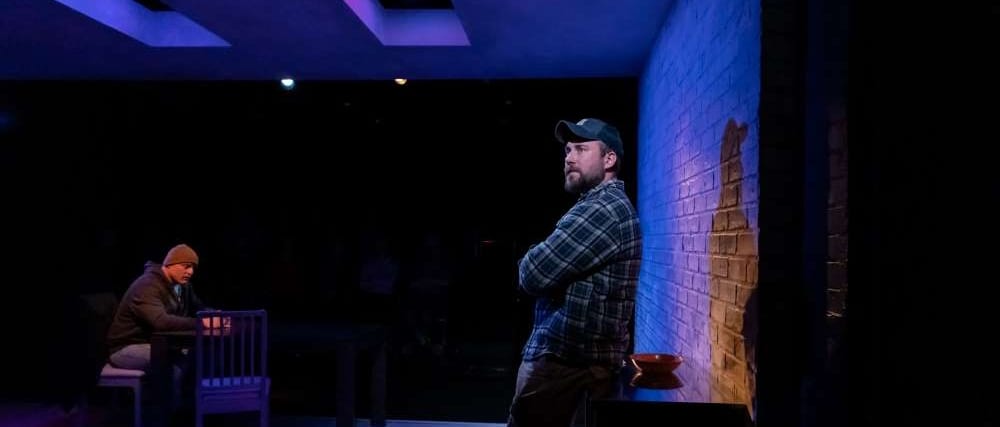Scott Organ’s 17 Minutes, presented by the Barrow Group and directed by its co-artistic director Seth Barrish, is a play about inaction: both an individual life upended by a failure to act, and also, implicitly, the larger, systemic inaction of a country that allows avoidable tragedies of gun violence to play out on a near daily basis.
The play is divided into seven short two-character scenes, each depicting Andy Rubens (Larry Mitchell) in the hours and months following a school shooting at the school where Andy stands guard as a sheriff’s deputy. The staging in the small theater is a white rectangle with a set consisting of some tables and chairs, quickly rearranged by the actors between scenes (scenic design by Edward T. Morris); Barrish’s direction is clear and unobtrusive.
A full account of the shooting is not given to the audience all at once, but emerges slowly, each new detail adding to the anguish. One of the students at Andy’s school opened fire with an AR, and though Andy heard the shots while in the courtyard, he never entered the building, but rather stood against the wall, frozen for seventeen minutes until the SWAT team arrived. The play follows Andy through various stages of denial, anger, grief, and depression.
While some of the scenes work better than others, the acting is uniformly excellent. The first scene, a conversation between a detective (a terrific Brian Rojas, making his off-Broadway debut) and Andy in the immediate aftermath of the shooting, is a virtuoso display of writing and acting, with information teased out as the detective tries to get Andy’s account of the incident on record. The scene is tense, gripping, naturalistic, and quietly devastating (an expanded version of it could in itself make a good play). The domestic scenes with Andy and his wife Samantha (DeAnna Lenhart) don’t work as well, as the writing seems more predictable and less grounded in specificity.
Another highlight of the evening is Andy’s reunion with his partner Mary Stevens (Shannon Patterson), who, unlike Andy, did enter the school and neutralized the shooter. Patterson has just one scene, but she brings Mary to life as a fully developed character, a mix of humorous self-deprecation alongside deep grief and trauma, and someone loyal and supportive of Andy and wary of her own status as “hero.”
Andy’s inaction is never fully explained, and Organ could perhaps give more insight into it without offering a pat explanation—we are told, after all, that Andy served in Iraq, which only makes his inability to properly read and respond to the situation more puzzling.
Mitchell is a pleasure to watch even as his vulnerability is sometimes hard to watch. He fully inhabits the character, subtly conveying the various stages of Andy’s emotional and psychological turmoil not only through words and tone of voice but also body language. While Andy must bear enormous guilt for the rest of his life, it pales in comparison to the guilt of a government that continues to sit idly by watching massacre after massacre tear communities apart.

